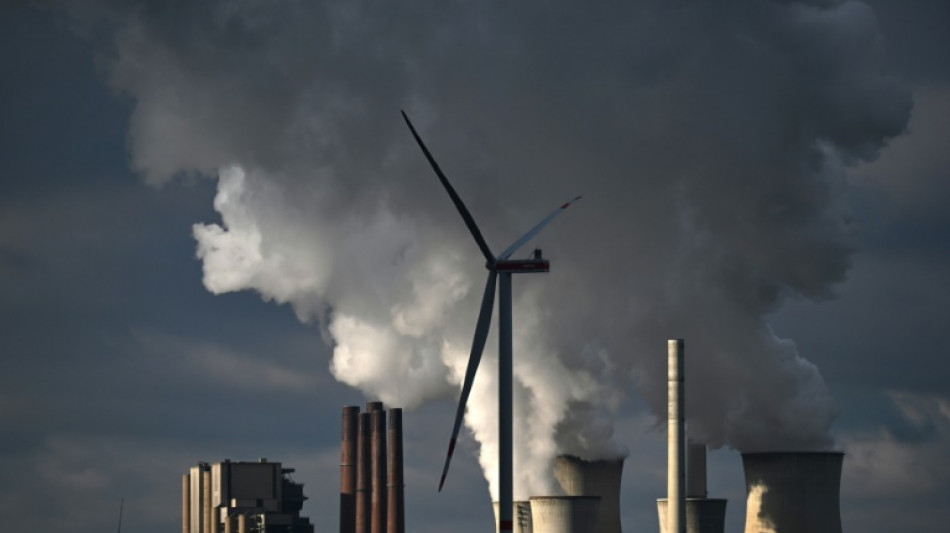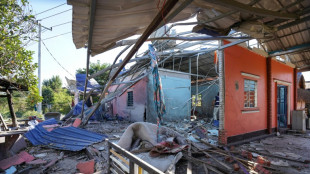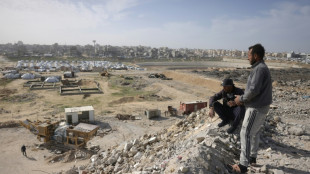
-
 Venezuela passes law to jail backers of US oil blockade
Venezuela passes law to jail backers of US oil blockade
-
French parliament passes emergency budget extension

-
 Trump in Epstein files: five takeaways from latest release
Trump in Epstein files: five takeaways from latest release
-
Wasteful Nigeria open AFCON campaign with narrow win over Tanzania

-
 Ukraine retreats in east as Russian strikes kill three, hit energy
Ukraine retreats in east as Russian strikes kill three, hit energy
-
Macron meets French farmers in bid to defuse anger over trade deal

-
 Ineos snap up Scotsman Onley
Ineos snap up Scotsman Onley
-
World is 'ready' for a woman at helm of UN: Chile's Bachelet tells AFP

-
 Real Madrid's Endrick joins Lyon on loan
Real Madrid's Endrick joins Lyon on loan
-
Latest Epstein files renew scrutiny of Britain's ex-prince Andrew

-
 US consumer confidence tumbles in December
US consumer confidence tumbles in December
-
Norwegian biathlete Sivert Guttorm Bakken found dead in hotel

-
 UK comedian Russell Brand faces two new rape, assault charges: police
UK comedian Russell Brand faces two new rape, assault charges: police
-
Venezuela seeks to jail backers of US oil blockade

-
 Norwegian biathlete Sivert Guttorm Bakken found dead
Norwegian biathlete Sivert Guttorm Bakken found dead
-
Wall Street stocks edge higher

-
 Vietnam Communist Party endorses To Lam to stay in top job
Vietnam Communist Party endorses To Lam to stay in top job
-
US economic growth surges in 3rd quarter, highest rate in two years

-
 Frank defends Van de Ven after Slot slams 'reckless' foul on Isak
Frank defends Van de Ven after Slot slams 'reckless' foul on Isak
-
Russian paramilitaries in CAR say take election threat 'extremely seriously'

-
 Trump in the Epstein files: five takeaways from latest release
Trump in the Epstein files: five takeaways from latest release
-
UK govt to relax farmers inheritance tax after protests

-
 Pakistani firm wins auction for state airline PIA
Pakistani firm wins auction for state airline PIA
-
Stocks slip on strong US growth data

-
 DR Congo beat Benin to kick off Cup of Nations bid
DR Congo beat Benin to kick off Cup of Nations bid
-
New Epstein files dump contains multiple Trump references

-
 Russian strike could collapse Chernobyl shelter: plant director
Russian strike could collapse Chernobyl shelter: plant director
-
Springbok captain Kolisi to rejoin Stormers

-
 Italy fines Ryanair $300 mn for abuse of dominant position
Italy fines Ryanair $300 mn for abuse of dominant position
-
Mahrez eyes strong AFCON showing from Algeria

-
 Killer in Croatia school attack gets maximum 50-year sentence
Killer in Croatia school attack gets maximum 50-year sentence
-
Thousands of new Epstein-linked documents released by US Justice Dept

-
 Stocks steady as rate cut hopes bring Christmas cheer
Stocks steady as rate cut hopes bring Christmas cheer
-
Bangladesh summons Indian envoy as protest erupts in New Delhi

-
 Liverpool's Isak faces two months out after 'reckless' tackle: Slot
Liverpool's Isak faces two months out after 'reckless' tackle: Slot
-
For director Josh Safdie, 'Marty Supreme' and Timothee Chalamet are one and the same

-
 Kyiv's wartime Christmas showcases city's 'split' reality
Kyiv's wartime Christmas showcases city's 'split' reality
-
Locals sound alarm as Bijagos Islands slowly swallowed by sea

-
 Cambodia asks Thailand to move border talks to Malaysia
Cambodia asks Thailand to move border talks to Malaysia
-
In Bulgaria, villagers fret about euro introduction

-
 Key to probe England's 'stag-do' drinking on Ashes beach break
Key to probe England's 'stag-do' drinking on Ashes beach break
-
Delayed US data expected to show solid growth in 3rd quarter

-
 Thunder bounce back to down Grizzlies, Nuggets sink Jazz
Thunder bounce back to down Grizzlies, Nuggets sink Jazz
-
Amazon says blocked 1,800 North Koreans from applying for jobs

-
 Trump says US needs Greenland 'for national security'
Trump says US needs Greenland 'for national security'
-
Purdy first 49er since Montana to throw five TDs as Colts beaten

-
 North Korea's Kim tours hot tubs, BBQ joints at lavish new mountain resort
North Korea's Kim tours hot tubs, BBQ joints at lavish new mountain resort
-
Asian markets rally again as rate cut hopes bring Christmas cheer

-
 Australian state poised to approve sweeping new gun laws, protest ban
Australian state poised to approve sweeping new gun laws, protest ban
-
Trapped under Israeli bombardment, Gazans fear the 'new border'

| RBGPF | 0% | 80.22 | $ | |
| SCS | 0.12% | 16.14 | $ | |
| CMSC | -0.55% | 23.01 | $ | |
| BCC | -1.45% | 73.17 | $ | |
| JRI | 0.15% | 13.39 | $ | |
| BCE | -0.19% | 22.686 | $ | |
| NGG | 1.16% | 77.31 | $ | |
| RYCEF | 0.19% | 15.53 | $ | |
| GSK | 0.36% | 48.765 | $ | |
| RIO | 1.26% | 81.12 | $ | |
| RELX | 0.35% | 41.125 | $ | |
| BTI | 0.43% | 57.015 | $ | |
| CMSD | -0.83% | 23.01 | $ | |
| BP | 1.17% | 34.545 | $ | |
| VOD | 1.38% | 13.06 | $ | |
| AZN | 0.55% | 92.055 | $ |

World's major courts take growing role in climate fight
The world's top court is poised to tell governments what their legal obligations are to tackle global warming, and possibly outline consequences for polluters that cause climate harm to vulnerable countries.
Wednesday's highly anticipated advisory opinion by the International Court of Justice comes in the wake of landmark international decisions that experts say together have the potential to significantly shape climate action.
- How has climate litigation evolved? -
Andrew Raine, deputy director of the UN Environment Programme's law division, said frustration over the pace of climate action had spurred people, organisations and countries to turn to the courts.
"When political systems fall short, the law is increasingly seen as a tool for driving ambition and enforcing commitments that have been made," he told AFP.
These have been bolstered by increasingly precise and detailed climate science, including from the UN's IPCC climate expert panel.
Almost 3,000 climate cases have been filed up to the end of 2024, in nearly 60 countries, according to the Grantham Research Institute, using data compiled by the Sabin Center for Climate Change Law.
While not all have been successful -- and some have tried to slow climate progress -- there have been notable cases in recent years that have pushed states to do more.
Urgenda, an environmental organisation in the Netherlands, notched a win at the Dutch Supreme Court in 2019, with justices ordering the government to reduce its greenhouse gas emissions by 25 percent by the end of the following year.
And in 2021, the German Constitutional Court found that the government's failure to sufficiently cut planet-heating pollution placed an unacceptable burden on future generations.
Raine said that litigation was increasingly crossing borders, with 24 cases brought before international or regional courts, tribunals or other bodies.
"This marks a turning point and it reflects the transboundary and shared nature of the climate crisis," he said.
- Why have recent cases been deemed historic? -
Two in particular have been hailed as watershed moments that will help shape how courts, governments and businesses understand and act on their climate responsibilities.
Last year, an advisory opinion by the International Tribunal for the Law of the Sea said carbon emissions can be considered a marine pollutant and that countries have a legal duty to take measures to reduce their effects on oceans.
The tribunal made clear that the work of defining countries' obligations is not limited to the Paris climate agreement or the UN body that runs climate change negotiations.
Major polluters have argued that the UN framework is sufficient and against courts taking climate decisions.
Another major advisory opinion was issued this month, with the Inter-American Court of Human Rights reaffirming the right to a healthy climate system and acknowledging the rights of nature.
But perhaps the court's most profound statement was to place protection against irreversible climate harms on the same level as international prohibitions on genocide and torture, said Cesar Rodriguez-Garavito, Professor of Law and Director of the Climate Law Accelerator at New York University.
The court said "massive and serious harm to the climate system through emissions, through deforestation and so on, is absolutely forbidden by international law," he said.
In his view this made it the strongest statement yet by any international court on states' duty to avoid causing severe ecological destruction.
All eyes are now on the ICJ.
- What could be the impact? -
Vanuatu, one of many low-lying islands threatened by sea level rise, has asked the ICJ to give its opinion on states' obligations to reduce emissions.
But the potentially more controversial request is what -- if any -- legal consequences there might be for major polluters who cause severe climate damages.
"These are questions of global justice," said Rodriguez-Garavito, potentially touching on contentious issues of "reparations for climate harms" to those least responsible for emissions.
While advisory opinions like the ICJ are not legally enforceable, Raine said they carry significant weight.
"They clarify how international law applies to the climate crisis, and that has ripple effects across national courts, legislative processes and public debates," he said.
"It doesn't force states to act, but it shows them where the law stands and where they should be headed."
L.Harper--AMWN